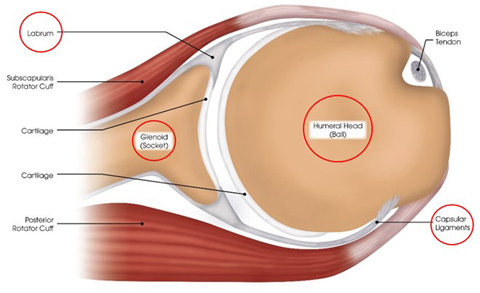
Shoulder dislocation puts Japan’s World Cup aspirations in question
Japan’s star and the Blue Samurai’s goal-scoring midfielder, Shinji Kagawa, suffered a shoulder dislocation in a soccer match against Syria that ended in a draw but advanced Japan to a qualifying round in the Asian Football Confederation and ultimate opportunity to compete in the World Cup. The 28-year-old soccer phenom dislocated his left shoulder after falling awkwardly during the match. According to news reports, FIFA officials are prohibiting Kagawa from competing in the next World Cup qualifier game against Iraq because of the “magnitude of his injury.”
The shoulder is one of the most mobile joints in the body and susceptible to dislocations from a fall or trauma. Most shoulder dislocations occur when the arm is forced upward and outward behind the body, resulting in the dislocation of the humeral head (ball of the upper arm bone) out of the front of the glenoid, (shoulder socket) and the tearing of ligaments and the labrum, which function to stabilize the ball and socket joint.
Shoulder dislocations require prompt evaluation and treatment from expert medical professionals in order to examine the person for other shoulder injuries and to restore blood flow to the area by reducing (repositioning) the humeral head back into the shoulder socket. Magnetic resonance imaging (MRI) and X-rays are indicated after a shoulder dislocation to rule out neurovascular, ligament, or rotator cuff tears, which require early surgical intervention.
Signs and symptoms of an anterior dislocation may include but are not limited to:
• Severe pain
• Loss of shoulder/arm function
• Numbness, tingling, weakness, or paralysis of the arm
• Shoulder wanting to “fall out of place”
• Shoulder deformity
• Loss of or decreased wrist pulse–this may indicate blood vessel involvement involving decreased circulation to the arm and is a serious problem requiring emergent care.
Age is the biggest influence on the prognosis of the dislocations. Dislocations in people younger than age 40 usually have isolated capsulolabral tissue (labrum, capsule, and ligaments) injuries, whereas those older than 40 usually have rotator cuff involvement. Additionally, individuals under age 25 have an 80 percent or greater chance of repeat dislocations from the relative laxity (looseness) of their joint.
After ruling out a fracture or rotator cuff injury, a medical professional most likely will prescribe several weeks of physical therapy in order to restore range of motion, strength, proprioception (position sense), and function of the shoulder.
Surgery is indicated when individuals experience recurrent dislocations, symptoms start to interfere with daily activities, or for younger, active individuals. Dr. Steven Chudik with the Shoulder, Knee & Sports Medicine Clinic is an expert in arthroscopic shoulder surgery. He uses an arthroscopic approach that involves several small incisions (less than 1 cm), tiny instruments and a camera so he can “see” inside the shoulder as he slides the instruments between the layers of muscle, tissue, tendons and ligament without using an open surgical approach that cuts through the muscle, tissue and tendons.
From inside the shoulder, Dr. Chudik arthroscopically repairs the injured tissues and restores stability to the shoulder. Following surgery, athletes can return to their sport in four to six months. With some in-season athletes, Dr. Chudik is able to rehab their shoulders, delay surgery until the off-season and get them back on the field in just a few weeks.
As expected, recent news reports claim Kagawa will return in approximately three to four weeks in time to help his team finish strong and advance to the 2018 World Cup in Russia.
The opinions provided by Dr. Chudik are just that, opinions. However, they are based on more than 15 years of experience treating athletes with shoulder injuries and on the information available at the time of publication. Dr. Chudik did not perform a formal physical assessment and/or diagnosis on Shinji Kagawa.
If you or someone you know suffers from shoulder pain or any of the symptoms described earlier, consider scheduling an appointment with Dr. Steven Chudik at the Shoulder, Knee & Sports Medicine Clinic. A Top Doctor in orthopaedics, Dr. Chudik is renowned for his arthroscopic shoulder expertise and innovative procedures that reduce shoulder surgical trauma, speed recovery and yield excellent outcomes. Dr. Chudik has been treating patients since 2002 throughout the Chicago area—including Western Springs, Wheaton and Addison—as well as patients from both coasts. He has convenient hours and clinic locations plus onsite X-ray and MRI imaging capability. To schedule an appointment with Dr. Chudik, call 630-324-0402, or schedule on his website at https://www.stevenchudikmd.com/schedule-online/.








